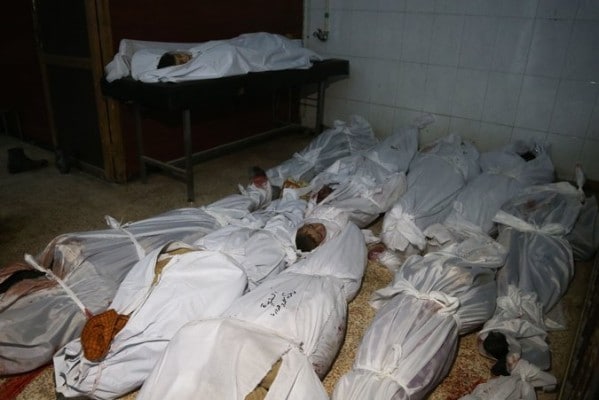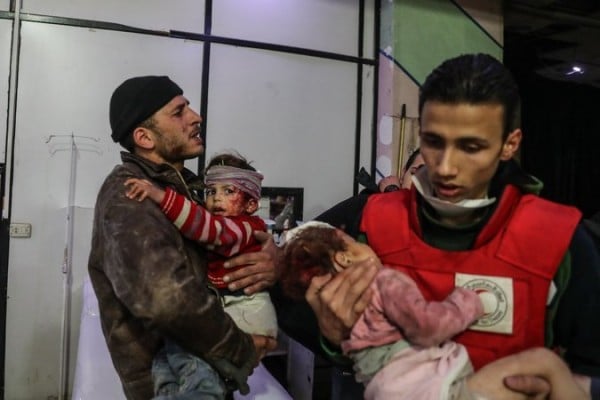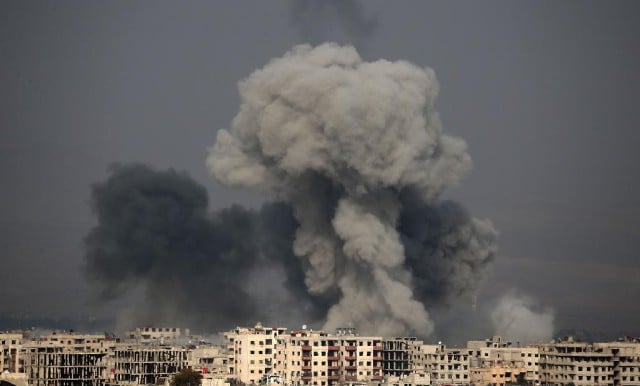“We might die any moment. You don’t know where the rockets might come from and end our lives.”
LATEST
- Erdoğan: Issue of Pro-Assad Militia in Afrin “Closed for Now”
- Russia Finally Acknowledges Significant Casualties from US Airstrikes
About 100 people in the besieged East Ghouta area, near Syria’s capital Damascus, have been killed for the second day in a row by pro-Assad attacks.
The Assad regime and its allies, preparing for an invasion to overrun the territory held by the opposition since 2012, maintained their latest surge in bombing, shelling, and rocketing across several towns. Some claims said the death toll was 250 on Monday and Tuesday, following at least 230 slain and more than 800 wounded in six days in early February.
In the town of Beit Sawa alone, where 18 people were slain on Monday, another 27 died yesterday.
A local doctor summarized:
We are standing before the massacre of the 21st century. If the massacre of the 1990s was Srebrenica, and the massacres of the 1980s were Halabja and Sabra and Shatila, then eastern Ghouta is the massacre of this century right now.
A little while ago a child came to me who was blue in the face and barely breathing, his mouth filled with sand. I emptied it with my hands. I don’t think they had what we do in any of the medical textbooks. A wounded child breathing with lungs of sand. You get a child, a year old, that they saved from the rubble and is breathing sand, and you don’t know who he is.
All these humanitarian and rights organisations, all that is nonsense. So is terrorism. What is a greater terrorism than killing civilians with all sorts of weapons? Is this a war? It’s not a war. It’s called a massacre.
But the Assad regime showed no hesitation over the killings. Brig. Gen. Suheil al-Hassan, the commander of the paramilitary Tiger Force, said in a video:
I promise, I will teach them a lesson, in combat and in fire. You won’t find a rescuer. And if you do, you will be rescued with water like boiling oil. You’ll be rescued with blood.
Bodies in an East Ghouta morgue on Tuesday:

Photo: Abdulmonam Eassa (AFP/Getty)
Russia, whose airstrikes are essential for any pro-Assad advance, has not formally joined the assault. However, local journalists reported attacks by Russian Su-34 warplanes.
Foreign Minister Sergey Lavrov has set up the pretext for Russia to bomb and help tighten a 5-year siege — as it did with opposition-held eastern Aleppo city in 2016 — by invoking the false claim that the offensive is against the hardline Islamist faction “Jabhat al-Nusra”.
In fact, Jabhat al-Nusra, now known as Jabhat Fatah al-Sham, has only a small number of fighters in East Ghouta.
Russia had signed a de-escalation agreement with rebels last July.
State Department spokeswoman Heather Nauert said the US is “deeply concerned”: “This escalation is exacerbating the already grave human suffering of nearly 400,000 people.”
Nauert said the US supported a UN appeal for a month-long cease-fire, issued more than two weeks ago.
Analyst Thomas Pierret is sceptical about the British response:
"The world is watching", yes, and because it's only watching, Assad & friends couldn't care less. A credible threat, or nothing. https://t.co/Eza5fsqkEf
— Thomas Pierret (@ThomasPierret) February 21, 2018
“Warplanes Have Not Stopped”
Six hospitals have been struck over the last two days, putting three out of service, said Panos Moumtzis, the UN’s regional humanitarian coordinator: “I am appalled and distressed by reports of the horrifying attacks.”
Another key hospital was hit and shut Tuesday, the Syrian American Medical Society said, while a White Helmets rescuers was among victims.
We lost another hero today "Firas Jumaa" a volunteer of @SCDrifdimashq in #EasternGhouta, killed during his humanitarian duty in #BeitSawa town in #BesiegedGhouta #RIP #Heroes #SaveGhouta pic.twitter.com/DK2uSzEOwT
— The White Helmets (@SyriaCivilDef) 20 February 2018
Shams, a mother of two children, told Al Jazeera:
Warplanes have not stopped soaring over the city. When the shelling temporarily stops, they start firing missiles at us….
We reached a point where we don’t even leave the house during these raids so that if we’re attacked, we die together.
Khalid Abulabed, a field doctor in the Damascus suburb, under siege since 2013, described the current situation as “crazy and catastrophic”:
It’s indescribable. It reminded me of what we used to see in Aleppo —- shelling day and night.
Nothing is excluded from the shelling, not schools, not residential areas, not even markets, which has caused a significant increase in the number of people martyred and wounded.
The casualties from the attacks are compounded by the siege, tightened since early 2017 by the Assad regime, which had led to scores of death from lack of food or medicine even before the latest surge in bombing.
Shams added, “Nothing else is available because of the siege. You can’t even find any shopkeepers to sell you anything in the midst of these attacks – we’re starving. If we don’t die from the shelling, we will of starvation.”
Dr Abulabed noted, “We don’t even have access to adequate medical equipment.”
The UN’s agency for children, UNICEF, tweeted in resignation:
We no longer have the words to describe children’s suffering and our outrage.
Do those inflicting the suffering still have words to justify their barbaric acts? #RunningOutOfWords#ChildrenUnderAttack #Syria pic.twitter.com/GH9V0Pgv5z
— UNICEF MENA (@UNICEFmena) February 20, 2018
The Assad regime’s news agency SANA insisted reports of the attacks were “lies, deception, and fabrications” used by “terrorist organizations and their sponsors within capital cities conspiring against Syrians”.
SANA’s English-language site continued to ignore East Ghouta. Instead, it headline the claim of seven people killed and 35 wounded in and near Damascus by rebel rockets and mortars.
So did Russian State outlet TASS, which preferred the announcement, “Russian reconciliation center in Damascus comes under shelling, no casualties.”
The director of the UN relief agency UNRWA verified deaths in Damascus, though not the attribution of responsibility:
A very sad day. A mortar attack killed 2 @UNRWA students, 13-year old Qusai Mohammed and 14-year old Bahaa Mohammed, while walking home from school in Damascus. Another was injured. Our thoughts and prayers go out to their families. This senseless and tragic bloodshed must stop.
— Mohammed Abdi Adar (@MohammedAAdar) February 21, 2018
A pro-Assad website boasted — while acknowledging Russian involvement in attacks — “Russian, Syrian warplanes and artillery all team up to blast militant defenses across east Damascus”.
Making no reference to the assault on civilians, it hailed “well in excess of forty pin-point airstrikes within a matter of hours”.
But a pro-Assad fighter, communicating with a pro-regime social media activist, boasted of the assault to come:
The final touches were added to the spring festival in Ghouta. Under the supervision of a large group of elite artists at playing the Shilka [artillery] and Maestro 23.
And the opening ceremony will be brought to life by the rising star the missile launcher. The ending will for the first time star the T-90 [battle tank], with his laser lights.
Meanwhile in East Ghouta, Tareq al-Dimashqi said of life with his wife and 5-month-old baby, “We might die any moment. You don’t know where the rockets might come from and end our lives.”

Injured children waiting for treatment at a hospital in Douma (Mohammed Badra/EPA)
Erdoğan: Issue of Pro-Assad Militia in Afrin “Closed for Now”
Turkish President Recep Tayyip Erdoğan has rejected an Assad regime effort to put its forces in the mainly-Kurdish city of Afrin in northwest Syria, saying the issue is “closed for now”.
Early Tuesday, pro-Assad militias moved into Afrin canton and tried to reach the city, which is facing a month-long Turkish-rebel offensive. However, the convoy was forced to check amid Turkish shelling — “warning shots”, said Ankara — and a vanguard withdrew from Afrin city, with units pulling back to a line about 10 km (6 miles) away.
Speaking at a joint news conference alongside his Macedonian counterpart in Ankara, Erdoğan said, “They were forced to go back after artillery shooting. This file is closed for now.”
The President claimed agreement with the Assad regime’s key allies, Russia’s Vladimir Putin and Iran’s Hassan Rouhani. Referring to the Kurdish militia YPG, he said:
Unfortunately, you know, these kinds of terrorist organizations have [sometimes] taken the wrong steps with the decisions [they have made] on their own….
It is impossible to give them a chance [in Afrin]. They would pay a heavy price for it.
Turkey considers the YPG to be part of the Turkish Kurdish insurgency PKK. To push back the militia and the Syrian Kurdish Democratic Union Party (PYD), it launched an offensive alongside Free Syrian Army units on January 18.
So far, the attacks have claimed only a limited area, notably high ground around the towns of Jinders and Rajo.
Russia Finally Acknowledges Significant Casualties from US Airstrikes
Russia has finally acknowledged significant casualties among its forces from US airstrikes on February 8, amid a failed pro-Assad assault on the American-backed, Kurdish-led Syrian Democratic Forces in eastern Syria.
Multiple sources in Russia — colleagues, relatives, and doctors — have spoken of numerous casualties among fighters of the Russian “private military company” Wagner Group when it tried to take area around a Conoco gas plant, east of the Euphrates River in Deir ez-Zor Province. Reports said there were up to 300 casualties among the force of about 550 personnel, with up to 200 killed.
The Kremlin and the Russian Foreign Ministry stonewalled questions for days until Ministry spokeswoman Maria Zakharova said last week — after some of the Wagner fighters were identified — that five “Russian citizens” had reportedly been slain.
On Tuesday, Zakharova finally acknowledged a larger toll of citizens who were not in the offical Russian armed forces: “In the course of a recent military confrontation…there were deaths [among] citizens of Russia and countries of the CIS [former Soviet republics]…and there were wounded — several dozens of them,”

